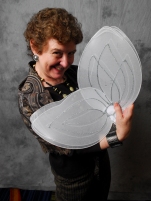
Valerie Beaman
Incubators - Not Just for Chickens
Posted by May 18, 2011

Valerie Beaman
Arts incubators are not a new model, but it seems to me that recently some of them have taken on a new joie de vivre. I attribute this to the fact that they are no longer necessarily focused on developing artists into new 501(c)(3) organizations, but empowering ordinary mortals to try their hand at creating something for their own imagination and amusement.
The success of organizations like Brooklyn’s 3rd Ward is confirming research which finds that the younger generation wants to participate in art, not passively observe it. 3rd Ward is a for-profit membership organization which provides space, back office services, food, galleries, a supportive community, and top-of-the-line creative resources, including photo studios, media lab, jewelry studio, wood & metal shops, along with a huge education program. You don’t have to be a member to enjoy the classes, but membership gets you access to the studios.
Read More











